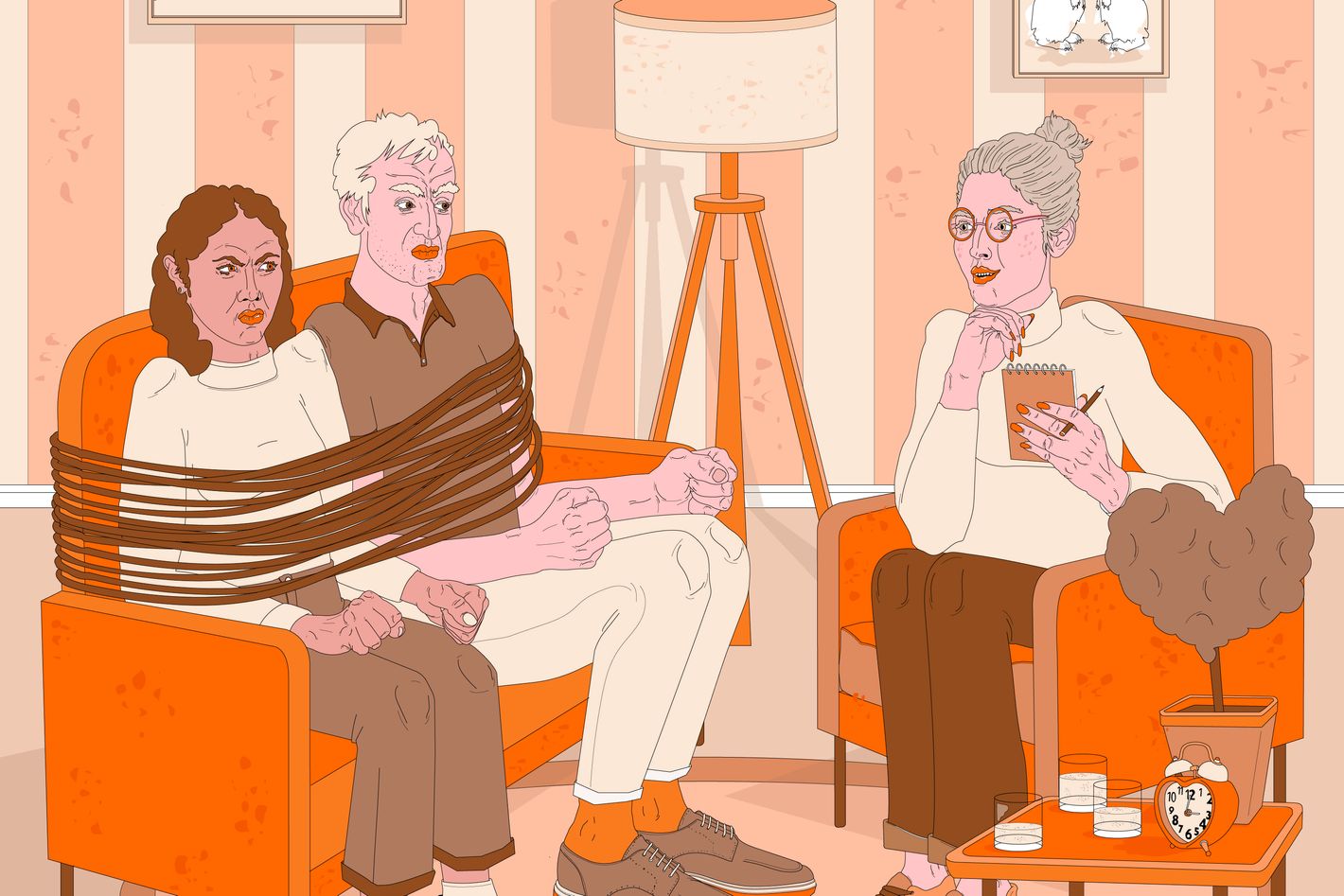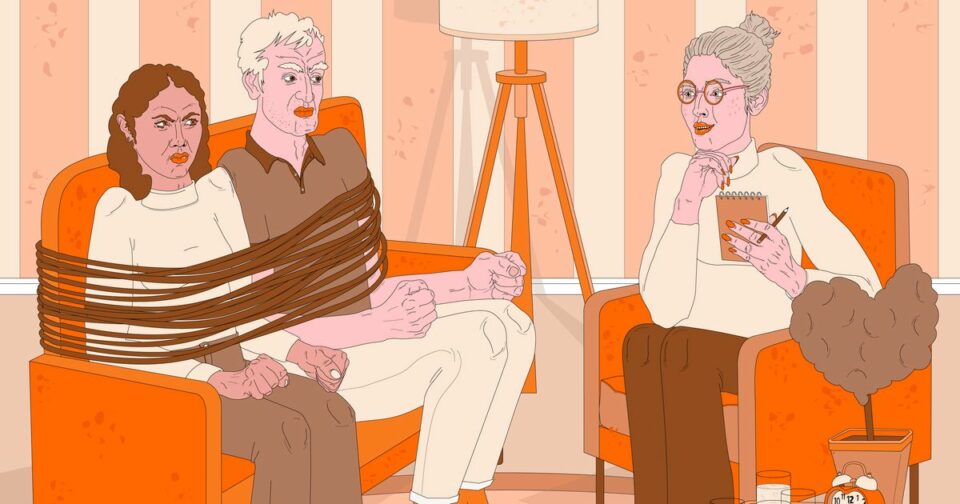
When I ended my decade-long relationship with my ex, my therapist clapped her hands over her head and screamed out, exalted: “YES!” For almost four years, whenever we talked about him, she looked at me like I was talking about how much I loved drinking expired strawberry milk. “Sorry,” she said, quickly collecting herself after the “good” news. “I know I shouldn’t root for this. But I hated him.” I was grateful for her disclosure; it had been a while since anyone had been honest with me about the state of my relationship, myself included.
I started seeing my current personal therapist right after my husband and I moved to New York from Toronto in late 2018. Our four-day-long, 180-person wedding wrapped two weeks before we moved, forcing us to navigate a foreign country and a tender marriage in tandem. Back then, I introduced my husband to my therapist only through his best stories: how he made me laugh instead of cry at the airport as we were leaving our lives behind, how he brewed my tea with three crushed cardamom pods the way I like, how much I appreciated feeling like I was on a team instead of an unmoored transient. But even when our marriage was good, I could forecast how it might become unbearable. When the pandemic settled in New York just over a year after our move, I had no confidence that we’d be strong enough to survive this particular dystopia.
I like analysis. In the time I was with my ex, I saw more therapists than I currently have friends. I talked to them about my sexual assault, my disordered eating, my mother, my anger — you know, the woman-in-her-30s starter pack. Steadily, our conversations turned to being almost entirely about my relationship: Our work schedules were always at odds; I hated how tidy he wanted to keep the apartment; worst of all, he wanted to go hiking all the time and I just wanted him to tell me he liked me. I could tell he didn’t. I started to forget what it felt like when he did.
When our relationship first got rocky early on, everyone told me to try couples therapy. As a good little millennial raised on daily Oprah episodes and bolstered by viral Gabor Maté clips on Instagram, I thought it seemed like the obvious decision. And so for years, from the time we were just dating all the way to the brittle end of our marriage, we sat in front of an array of interchangeable therapists who were all named Teresa. (Or, at least, they all looked like Teresas.) They always had two chairs or two couches, forcing us to sit across from each other like we were hosting an adversarial podcast on TikTok. Some of them seemed to believe the narrative we gave them about our relationship — that we were cosmically destined to be with each other and therefore just had to figure out this current rough patch — while others seemed totally unable to help us get out of the quicksand of our arguments.
I thought our troubles were fundamental to our personalities and would require significant work; my husband thought our issues could be chalked up to stressful life events. Early in our relationship, he told me we were fighting because he wanted us to move forward and I was standing still, so we moved in together as proof of my commitment. Then he told me we were fighting because wedding planning was stressful; we got married, and so the planning ended. He said we would start getting along once the pandemic ended; it thawed just like winter, and still our marriage was unrecognizably icy. I twirled in front of him in a new pair of gold sequin pants before my company’s Christmas party. “How do I look?” I asked, to which he replied, “You didn’t take out the trash.” We were such disappointments to each other.
Instead of helping us see each other more clearly, therapy gave us new words to use to criticize each other. Every constructive lesson became a knife.
Sometimes we’d leave sessions together and I would hear one of the Teresas sigh behind the door she had just closed. I could tell we were exhausting them, just as I knew that all their strategies would likely fail with us. Teresa No. 1 thought everything was my ex-husband’s fault, but Teresa No. 4 thought it was all mine. Teresa No. 2, after listening to me talk for 51 minutes about how I felt hopeless, shrugged her shoulders at me. “I don’t know what to say,” she replied. I did. I wanted her to say that we should end our relationship with the remaining scraps of dignity we had. She never did, and we instead just moved on to the next Teresa we found. When I cried to Teresa No. 3 that I felt like a failure as a wife, she cried with me, her heavy tears rivaling my own. That night, my ex suggested we should stop seeing her. “I don’t think she’s equipped to receive your feelings,” he said. It took us months to find someone else who seemed to understand us both, another problem attributed to my Big Feelings. Teresa No. 5 told us we needed more sessions more frequently. “There’s a lot of work to do here,” she said, and I wanted to pull her hair. Should there be this much work between two people who ostensibly love each other? Even the ones who seemed to know we were doomed still opened their calendars at the end of each session and urged us to come back, to try again.
But instead of helping us see each other more clearly, therapy gave us new words to use to criticize each other. Every constructive lesson became a knife. I learned about trauma responses, and so everything he did elicited a trauma response in me. He was my father! I was his mother! When he learned about gaslighting, everything I did became gaslighting. When we argued about a time he called me stupid, therapy gave him a new explanation for why he said it (repeatedly): “We talked about this. I lashed out because I felt disconnected from you. We need more date nights.”
Marriage counseling started gaining traction in the U.S. in the late 1920s. Its roots are originally in eugenics, spearheaded by Paul Popenoe, a marriage counselor who also thought mentally ill people should be involuntarily sterilized. Popenoe’s argument was that stable, Caucasian marriages were needed in order to ensure that white, middle-class families maintained social, political, and cultural dominance. If the family was secure, the future of the race was too, and family therapy was designed to maintain “family togetherness,” just for a particular kind of family. My white husband didn’t know this — nor did I — every time we entered a therapist’s office. All our therapists were white, as so many therapists are, and though they always took great pains to nod slowly and diligently when I outlined my own issues in my marriage, I was outnumbered. Neither our white therapists nor my white husband understood why I traveled home so often to visit my mother, why it seemed that my nuclear family took precedence over whatever it was my husband needed. “Maybe you need to prioritize your new family,” one of the Teresas told me. My mom, who emigrated to Canada from India in the late ’70s, lived so far from her own mother that they would go a whole decade without seeing each other. I refused to come close to repeating this generational curse, regardless where either of us lived; no Teresa could convince me otherwise.
Couples therapy is rarely designed to tell you to quit — cynically, why would it be? We’d stop going and our out-of-pocket payments would stop too — but nothing would have been more loving. The kindest thing my ex could have done was leave me, even if we were still trying to make it work. After therapy, on the morose subway ride home where I would hold his limp hand, we’d zone out staring at ads for dating apps. “What should we do for dinner?” he’d ask, and we’d pretend, yet again, to be on the same team.
Only in hindsight can I see what I wanted the therapist to tell me. I wanted permission. I wanted to be told I could stop trying. I wanted her to tell me I had done everything I could — that we had indeed put in the work and shouldn’t feel ashamed for throwing in the towel. After all, we tried. It’s not “failing” if you give your relationship everything you have. I don’t regret any of our time with the Teresas; I needed to try just a few more times to make it work, and I needed someone to be a witness to my misery. Teresas No. 1 through No. 6 never told me to leave, but little by little they helped me give myself permission all the same.
As I was moving out of our apartment, my ex made this final assessment about me: No one would put as much work into me as he did. No one would love me enough to try this hard. He would be the only person who’d ever try to keep me. I thought about this a lot as I untangled my life from his, as I went through my calendar and removed the future sessions we had planned with lucky Teresa No. 7. I thought about it when I added sessions for just me and my own therapist — while no one would split the cost with me, I knew it would be worth every out-of-pocket cent. I knew he meant it as a cruelty, but I repeated his words to myself whenever I felt unsure about ending things for good: No one will ever put this particular kind of work into a relationship with me again. No one will ever fight this hard to stay with me.
God. I hope he’s right.
More From This Series
- Is It Time to Quit Therapy?
Scaachi Koul , 2024-05-14 13:00:53
Source link


